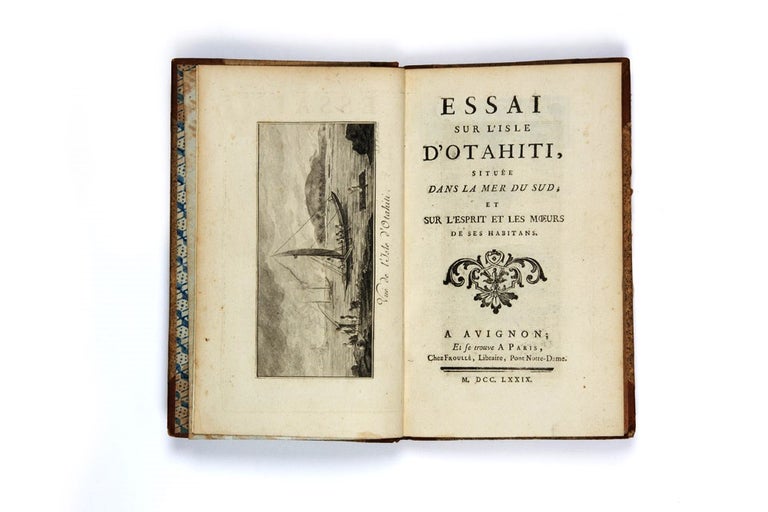Essai sur l'Isle d'Otahiti…
Essai sur l'Isle d'Otahiti, située dans la Mer du Sud, et sur l'esprit et les moeurs de ses habitants.
Avignon and Paris: Froulle, 1779.
Octavo, with an engraved frontispiece view of Tahiti; a fine copy in contemporary speckled half calf.
The earliest separate serious work on Tahiti
First edition: the very scarce and earliest separate serious work on Tahiti (predated only by the Omai-based fictions and the poetical satires on Joseph Banks); it is based for its facts on the reports of Wallis, Bougainville and Cook, and for its philosophy on Montesquieu and Rousseau. 'Taitbout's pamphlet is of interest, not for the originality of its ideas, but because it reveals how notions of geographical control deriving from Montesquieu and applied by the Forsters to the islanders of the Pacific, could provide a rational explanation for the soft primitivism with which Bougainville, Hawkesworth, Banks, Diderot, and others, had endowed the peoples of the Society Islands, and add point and fire to a revolutionary pamphlet…' (Bernard Smith, European vision and the South Pacific, 1985, p. 87).
First edition: the very scarce and earliest separate serious work on Tahiti (predated only by the Omai-based fictions and the poetical satires on Joseph Banks); it is based for its facts on the reports of Wallis, Bougainville and Cook, and for its philosophy on Montesquieu and Rousseau. 'Taitbout's pamphlet is of interest, not for the originality of its ideas, but because it reveals how notions of geographical control deriving from Montesquieu and applied by the Forsters to the islanders of the Pacific, could provide a rational explanation for the soft primitivism with which Bougainville, Hawkesworth, Banks, Diderot, and others, had endowed the peoples of the Society Islands, and add point and fire to a revolutionary pamphlet…' (Bernard Smith, European vision and the South Pacific, 1985, p. 87).
Tahiti was much discussed in Europe from the early 1770s, and various voyage accounts were in print during that decade. The Tahitian Aotourou had travelled back to Paris with Bougainville in 1769, while Omai had reached London with Cook in 1774. 'After its successive discoveries by Wallis, Bougainville, and Cook, Tahiti came to symbolize a living social and political experiment in the minds of many European philosophers: a primitive paradise that became spoiled and tainted by Western decadence. In this little work, often attributed to Bougainville – perhaps because it borrows extensively from his narrative and the earlier accounts of Cook and his accompanying naturalists, Joseph Banks and Daniel Solander – Taitbout speculates on the fundamental differences between the "homme sauvage" and the "homme civilizé," drawing from the example of Tahiti. He suggests that societies like Tahiti, that evolved in isolation, could offer political lessons to European nations, but acknowledges that the arrival of Europeans on their shores will deal them a death blow. Taitbout's purpose, in his own words (translated), is revolutionary: "to assist in bringing about the much-desired general revolution, to which the human spirit will one day owe the free, complete, and perfect union of all men"…' (online resource at princeton.edu).
Barbier notes that the book – published anonymously but now attributed to Taitbout – was in the past sometimes attributed to Bougainville. A German translation appeared in 1783.
This copy has an additional work bound at the end, P.A. Caron de Beaumarchais, Le voeu de toutes les nations…dans l'abaissement et l'humiliation de la Grande-Bretagne, 1778 (Sabin 4178).
Barbier, II 234; Kroepelien, 1271; O'Reilly-Reitman, 9291.
Condition Report: Spine label chipped but in fine condition otherwise.
Price (AUD): $4,200.00
US$2,711.10 Other currencies



